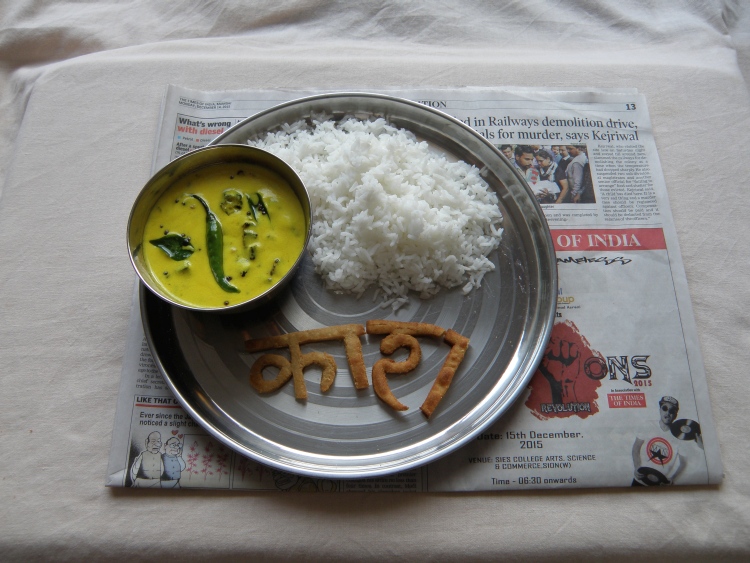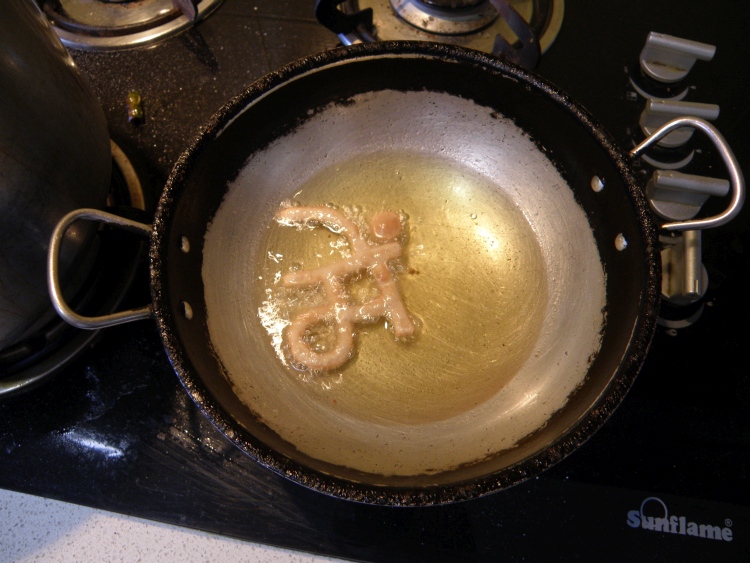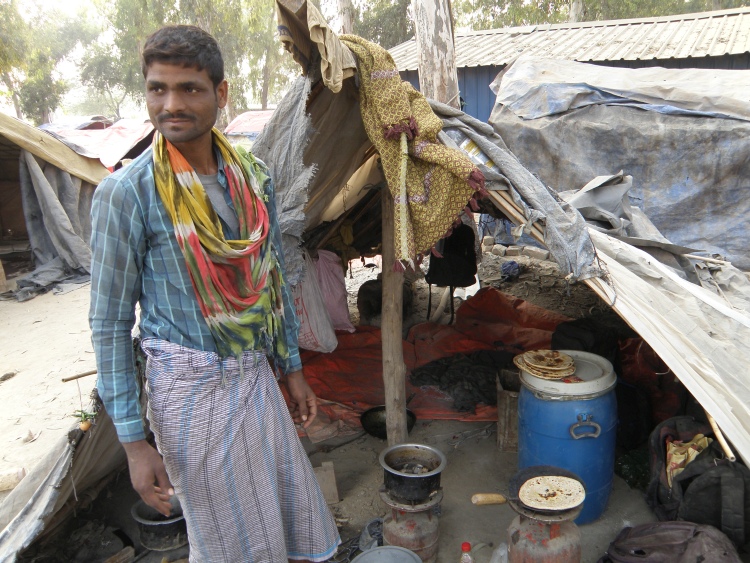One Pound Capitalism, A Pinch Of Democracy Under A Cold Sky
By Priti Gulati Cox & Stan Cox
29 December, 2015
Countercurrents.org

Featuring a meal recipe:
From Modi With Cold Love
This meal includes one of Indian Prime Minister Narendra Modi's favorite foods, bhendi kadhi (okra in yogurt sauce) and rice. Normally you would have papadam with this, but we've added a deep-fried quote instead.
Forced to serve seven
The series One Pound Capitalism, a Pinch of Democracy brings to our elite dinner tables meals that highlight issues exposing the extreme consequences of neoliberal policies that are disproportionately affecting the daily lives of Muslims, Dalits, Adivasis, and other marginalized people. The type and quantity of each ingredient used and the presentation of a meal is determined by choosing key statistics that are embedded in the issue being conveyed, converting that to a measurement, and then using it in the recipe. Indeed, there may be a dish or two that tastes somewhat strange, with an ingredient or two out of whack. But that’s intentional.

The ingredient measurements and presentation of this meal include certain facts and figures, which are italicized in the article that follows the recipe.
room-temperature rice
2 cups + 2½ tbsp basmati rice
4 cups + 5 tbsp water
Wash and clean the rice in running water. Add the water and bring to a boil on high heat. Turn heat down and simmer, covered, for 5 minutes. Set aside.
cold bhendi kadhi
5 tsp besan (chickpea flour)
1 tsp turmeric powder
salt to taste
saffron to taste (Modi's fundamental ingredient; optional otherwise)
2 cups yogurt
1½ cups water
12 bhendis (okra), washed, dried with a cloth and chopped
3 tbsp vegetable oil
for tempering:
1 tbsp oil
1 tsp each of mustard seeds and finely chopped ginger
12 curry leaves
7 split green chilis
1 tbsp chopped dhania (cilantro)
Put the besan, haldi, salt and saffron in a saucepan. Using an egg whisk, gradually add enough water to make a smooth paste. Mix the yogurt and water into the besan paste with the whisk and bring to a boil on a high flame stirring the mixture constantly. Once it reaches a boil, turn the heat down, cover and simmer for about 15 minutes, stirring occasionally. Meanwhile cook the chopped bhendis on medium heat in 3 tablespoons of oil in another pan till crispy. Remove from pan. In same pan heat 1 tbsp oil and add mustard seeds. When the seeds start popping, add the ginger, curry leaves and green chilis and cook for a few seconds till the ginger starts to brown a little. Add this tempering to the cooked yogurt sauce along with the chopped dhania and cooked bhendi pieces. Cool the kadhi to room temperature, cover and place in a fridge to cool further.
deep fried quote: Khule Aakash Mein Sote Hain Hum (We Sleep Under Open Skies)
Makes two full quotes. We have used Devnagri script for the quote.
12 tbsp aata (wholewheat flour)
salt to taste
5 tsp vegetable oil
water
vegetable oil for deep frying
Mix the oil and salt into the aata. Add enough water to make a smooth dough. Break dough into small pieces and flatten using a rolling pin to about 3 mm height each. Then, using a razor blade or exacto knife, cut the characters out and deep fry in oil till golden brown.
Take the kadhi out of the fridge. Divide it, the rice and quote into seven portions on a serving plate and serve. Save the other quote to snack on with your favorite cuppa.
Over 65 million people live in slums in India. An eyesore and a thorn in the side of modernization and development that benefits only the country's elite, the dwellings of these millions that make up the country's labor force and their families, are continuing to be bulldozed and demolished by the world's largest democracy. We witnessed the aftermath of one such neighborhood demolition in Delhi on December 17th, 2015.
One Pound Capitalism, a Pinch of Democracy Under a Cold Sky

On Saturday, December 12, Indian Railway authorities sent bulldozers to flatten Shakur Basti, a long-term settlement of more than twelve hundred homes in a New Delhi eucalyptus grove near a rail line. The demolition took more than nine hours to complete. Many of the residents were able to gather only their children and their identification and ration cards as they fled.
Demolition of people’s neighborhoods and workplaces by local governments in the name of modernization is a regular occurrence in cities across India, including New Delhi. Shakur Basti has seen more than its share of such assaults over the years, and this one would have received no more media attention than previous ones were it not for the death of a six-month-old baby. Her family says she was killed in the demolition, while the railway claims she was already dead when the bulldozers arrived. Either way, her loss was enough to draw the media spotlight to the plight of the thousands of residents stuck out in the December cold.
Those left shivering in the rubble had been dragged into the center of bitter political dispute. Indian Railways is an agency of India’s central government, also located in New Delhi and led by Prime Minister Narendra Modi. The railway owns the land under the slum and simply wants the people off of it, while the local government, through the Delhi Urban Shelter Improvement Board (DUSIB), is working to protect and provide services to all slums established in the city before 2006. And that includes Shakur Basti.
The struggle pits Modi against Delhi’s populist chief minister Arvind Kejriwal; it would be analogous to a standoff between a U.S. president and a D.C. mayor. Several previous attempts had been carried out by Indian Railways to demolish Shakur Basti without first, as required by law, providing residents decent housing elsewhere, but could not materialize following intervention by Kejriwal and the state government. The demolition was carried out finally on December 12 after three earlier notices, when the bulldozers roared in before city officials could stop them. Kejriwal arrived among the ruins at midnight to promise support to the residents and to point out the punitive timing of the assault, directly implicating India’s neoliberal, Hindu fundamentalist leader. “Railways under Prime Minister Narendra Modi chose one of the coldest days of the season to carry out this illegal demolition drive,” he noted.
Five days after the demolition, we visited Shakur Basti, now a tent city. Almost all of the families were still there (having nowhere else to live and needing to maintain their claim to residency on that land), and had constructed temporary shelters using tarpaulins—some orange and brand-new, some blue and weathered¬—that were provided by Kejriwal’s agencies. Each family, when possible, had placed its tarp-tent on the spot where their home had been. As a result, the view of Shakur Basti from a high spot along the road was now eerily reminiscent of the scene in Tacloban, Philippines in 2014, when people huddled under temporary shelter on their home sites two months after Typhoon Haiyan. The aftermath of a storm surge and a stormtrooper surge can look quite similar.
The families we spoke with said they had been in Shakur Basti for twenty to thirty years. This time, thanks to all the media attention, they dared to hope for a chance at relocation. Many of the men had jobs close by, unloading bags of cement from railway cars onto trucks, earning between Rs. 200 - 350 a day, but they said they would gladly move to a better place and commute back to work at the rail line. Mohammed Nizam said, “I am a laborer. We cannot live under these circumstances but then we live here. Politicians like Modi give us promises during elections but do nothing.” Speaking for a group of seven other fellow workers—Bikas Yadav, Ravinder Yadav, Ranjit Kumar Yadav, Mohammed Chand, Mohammed Murtuza, Mohammed Ashiq and Mohammed Israel—Mohammed Nizam had a similar message for the central government: “Tell Modiji we too voted for him and made him prime minister, and he must reassure us that he will provide a place to relocate, restore shelter, and we will go there willingly. As it is, we are sleeping under open skies.”

An extended family—Mohammed Kore, Meena Khatoon, Nisha Khatoon, and seven children named Anthony, Bhingul, Mohammed Nafil, Mana Khatoon, Taufiq, Guffran, and Sabir—had arranged their tarp shelters around a kind of circular courtyard. Meena showed us the tattered ration booklet that provides her family 5 kgs of rice and 5 kgs of gehoo (wheat kernels), her ID card, and her Aadhaar card that she had rescued from their home before it was crushed. She has yet to put the names of her children on the ration card. Doing so would give her access to more rations, but until then she has to make do with the 5 kgs of rice and gehoo. All of these documents would be essential for getting the family provisions and, if it can ever be arranged, relocation and a new home.
Under Kejriwal, DUSIB had set up headquarters on the site and was bringing in relief supplies: water, rice, flour, and vegetables. People were cooking over wood fires in stoves fashioned from mud and dried. The local government’s Delhi Disaster Management Authority was distributing prepared food, but a couple of days later Indian Railways, acting only because of a court order, would take over with boxed meals of the type they serve train passengers. Many of those, according to Manira Chaudhary of the website, Youth Ki Awaaz turned out to be too soggy or moldy to eat.

On the Monday after the demolition, the Asian Human Rights Commission expressed frustration that media coverage had focused on the question of whether the death of infant Rukaiyya, which drew the country's attention occurred before or during the demolition, rather than on the injustice of the assault itself and fate of the survivors. The commission wrote, “The discourse and debate has virtually no one invoking the right to shelter, for example, a basic human right, well recognized in both international and Indian jurisprudence.” On the same day, the Delhi High Court brought official focus back to the illegality and cruelty of Indian Raliways’ (and by implication, the Modi government’s) actions, using the most plainspoken of language: “You really don’t care about the people, you just want to remove them . . . You are forgetting what your role as a public authority is . . . Just because you’re the Railways doesn’t mean the law doesn’t apply to you.”
The demolition was big news for three days, and then it wasn’t. The day after the High Court statement, Kejriwal charged Modi with harboring a corrupt politician in his government, and Modi retaliated by sending Central Bureau of Investigation agents to raid the office of Kejriwal’s principal secretary. Kejriwal had had enough, tweeting that Modi was a “coward” and a “psychopath.” So through the week that followed, everything else— the baby’s death, the illegal demolition, government corruption—faded immediately into the background as debate centered on whether a criminal defamation complaint should be filed against Kejriwal. (It was). Meanwhile, night temperatures in Shakur Basti dipped dipped to 6 degrees and stuck there, and residents’ hopes of getting a roof over their heads dipped even lower.
Priti Gulati Cox is an interdisciplinary artist and has worked on social and political issues for 16 years. Stan Cox is co-author, with Paul Cox, of the upcoming book How the World Breaks: Life in Catastrophe's Path, From the Caribbean to Siberia. They live in Salina, Kansas and can be reached at [email protected] and [email protected].

